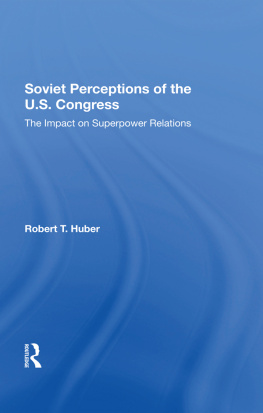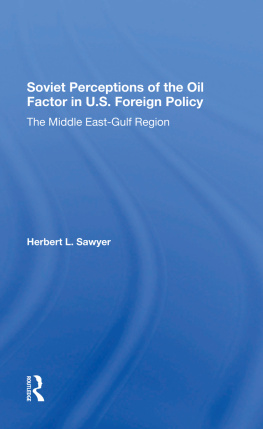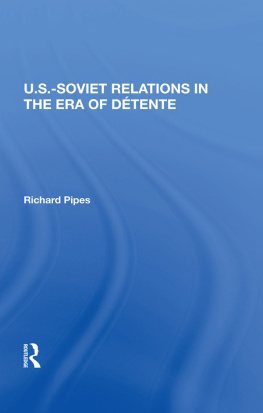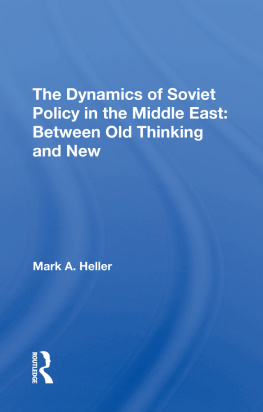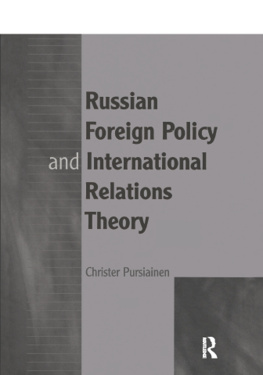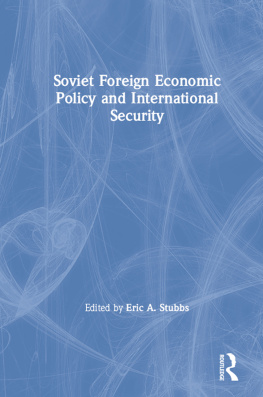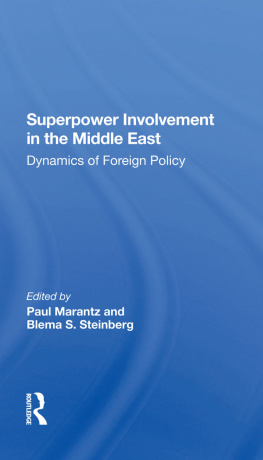Soviet Perceptions of the U.S. Congress
First published 1989 by Westview Press
Published 2019 by Routledge
52 Vanderbilt Avenue, New York, NY 10017
2 Park Square, Milton Park, Abingdon, Oxon OX14 4RN
Routledge is an imprint of the Taylor & Francis Group, an informa business
Copyright 1989 the Taylor & Francis
All rights reserved. No part of this book may be reprinted or reproduced or utilised in any form or by any electronic, mechanical, or other means, now known or hereafter invented, including photocopying and recording, or in any information storage or retrieval system, without permission in writing from the publishers.
Notice:
Product or corporate names may be trademarks or registered trademarks, and are used only for identification and explanation without intent to infringe.
Library of Congress Cataloging-in-Publication Data
Huber, Robert T., 1955-
Soviet perceptions of the U.S. Congress : the impact on superpower
relations / Robert T. Huber.
p. cm. (Westview special studies on the Soviet Union and
Eastern Europe)
Bibliography: p.
Includes index.
1. United StatesForeign relationsSoviet Union. 2. Soviet
UnionForeign relationsUnited States. 3. United States
CongressPublic opinion. 4. Public opinionSoviet Union
History20th century. I. Title. II. Title: Soviet perceptions
of the US Congress. III. Title: Soviet perceptions of the United
States Congress. IV. Series.
E183.8.S65H833 1989
327.73047dc19
88-17595
CIP
ISBN 13: 978-0-367-28834-1 (hbk)
The study of Soviet attitudes towards the role of Congress in U.S. foreign policy concerns an area of Soviet foreign policy considerations that has received little attention by Western scholars and that offers valuable new insights for the study of Soviet foreign policy and U.S.-Soviet relations. As such, this initial treading onto empirical virgin lands has required the thoughtful, meticulous, and in many instances indispensable guidance and support of a number of individuals.
At the outset, I wish to express my deep appreciation to F. Jackson Piotrow and Nicholas Onuf of the American University and to Thane Gustafson of Georgetown University, whose guidance with respect to research method, epistemology, internal organization, and substantive development of this study were invaluable. Similarly, in the collection and compilation of research materials, intellectual and logistical suggestions, and in his thoughtful evaluation of the study, Joseph Whelan of the Library of Congress deserves my special gratitude and mention.
A number of helpful stylistic and substantive suggestions were offered by William Inglee and Michael Poloyac of the House Foreign Affairs Committee staff. In suggesting research orientations, pointing out empirical cul-de-sacs and shortcomings, and for his constructive ruthlessness in critiquing this study, special thanks goes to John Hardt of the Library of Congress.
A special word of thanks also goes to Rep. Dante Fascell (D-Fla.), the chairman of the House Foreign Affairs Committee. His encouragement and moral support, as well as his willingness to be interviewed for this study, demonstrated in an important way the value of a thoughtful, wise, and sensitive superior.
I am also deeply indebted to Dr. Iurii Alexandrovich Ivanov, Section Chief of the Political-Military Department of the Institute of the USA and Canada, USSR Academy of Sciences. Dr. Ivanov, one of the Soviet Unions preeminent scholars on the U.S. Congress, was a most gracious and helpful sponsor during a visit to the Institute in May-June 1987. His input, and willingness to arrange a variety of important meetings with other Soviet americanists studying the Congress, provided an invaluable and irreplacable contribution to this study and helped to verify and revise important judgments made about the scope and direction of Soviet studies of the Congress in the last two decades.
Far too often, the thankless but essential tasks of typing, proofreading, collating, and preparing manuscripts are ignored by self-important authors. In this regard, I am deeply indebted to the superb work of a number of friends and colleagues. First and foremost, Beth Ford was an invaluable assistant in this endeavor. She did editing, manuscript preparation, and textual organization with a rare and consummate skill and intelligence. She also provided irreplaceable moral support during those inevitable times of frustration in preparing a study of this nature. Carol Glassman, Jennifer Grant, Deborah Hickey, and F. Marian Chambers also provided valuable assistance.
Finally, and most importantly, my most special appreciation goes to my wife, Lois, and my sons, Jeremy and Joshua, who bore the brunt of the creation of this manuscript and the long hours, interrupted weekends, and too often cantankerous husband and father. Only they know how much I depended on them.
Robert T. Huber
1
Western Studies of Soviet Foreign Policy
Studies of the Soviet Foreign Policy Process
In recent years, Western studies of Soviet foreign policy and the political system have focused on what has been called the input side of politics. Scholars have attempted to discern the relationship of the political authorities to demands and the supports generated in the political process. In particular, scholars have attempted, through a number of case studies, to demonstrate that Soviet foreign policy has been influenced by the ability of foreign policy specialists in the Academy of Sciences and Soviet party and government institutions (the foreign policy establishment) to help determine leadership policy decisions.
This scholarly effort has had both empirical and normative purposes. It has been empirical in its attempts to demonstrate systematically comparative political phenomena between the Soviet Union and other political systems and demonstrate the advantages and indeed the indispensability of a comparative approach to the study of Soviet politics. In tandem with this empirical effort has been a normative objective. American scholars have argued that, since the death of Stalin, Soviet foreign policy has changed from a totalitarian, ideological, confrontational posture to a more pluralistic, pragmatic, and negotiable posture.
For example, studies of Soviet foreign policy specialists have attempted to demonstrate influence and impact on policy formulation and implementation. In one such study, Soviet specialists on India in the late 1960s offered specific recommendations concerning economic development that were subsequently adopted by the Soviet leadership as reflected by Soviet aid programs to India.recommended great care in selecting client states as a way of saving aid resources and preventing Soviet association with unpopular, unstable regimes, and that increasing domestic economic requirements argue for a reevaluation of current Soviet aid policies to the Third World.
It is argued by Western scholars of the Soviet Union that the skepticism and sophistication of foreign policy specialists regarding Soviet prospects for enhanced political influence in the Third World have influenced the Soviet leadership, which in the 1980s, has set upon a course of restraint and caution in their policy towards the Third World. In line with the advice of foreign policy specialists, Soviet leaders in recent years have appeared to downplay Third World gains and have put in its place a renewed commitment toward seeking arms reductions, lowering East-West tensions and settling regional disputes peacefully.

